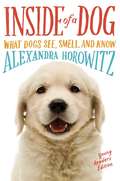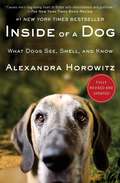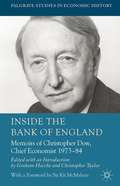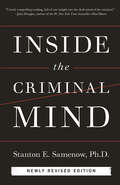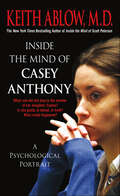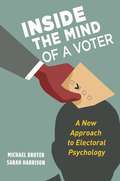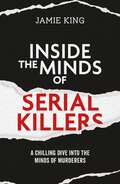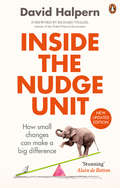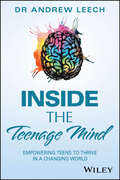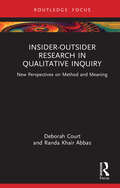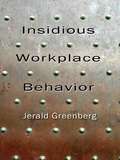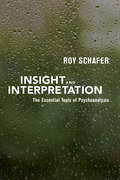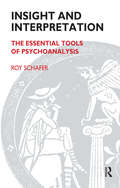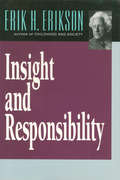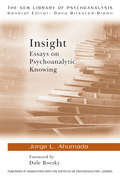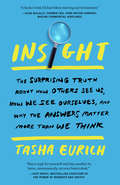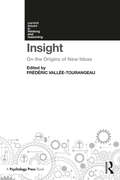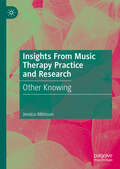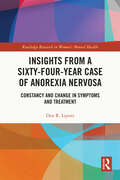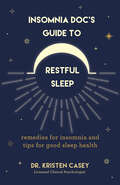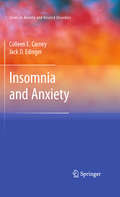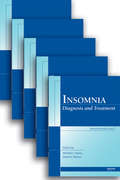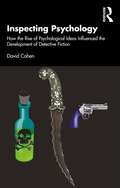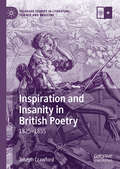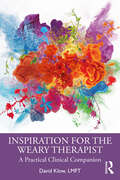- Table View
- List View
Inside of a Dog -- Young Readers Edition: What Dogs See, Smell, and Know
by Alexandra Horowitz Sean Vidal EdgertonFrom an animal behaviorist and dog enthusiast comes an adorable and informative guide to understanding how our canine friends see the world based on the #1 New York Times bestselling phenomenon, Inside of a Dog--now adapted for a younger audience!Have you ever wondered what your dogs are thinking? What they're feeling? Now you finally can! The answers will surprise and delight you as scientist and dog-owner Alexandra Horowitz explains how our four-legged friends perceive their daily worlds, each other, and that other quirky animal, the human.
Inside of a Dog: What Dogs See, Smell, and Know (Playaway Adult Nonfiction Ser.)
by Alexandra HorowitzNOW FULLY REVISED AND UPDATED! The beloved #1 New York Times bestseller that &“causes one&’s dog-loving heart to flutter with astonishment and gratitude&” (The New York Times Book Review).The instant classic on the mind of the dog is now updated to include the latest results in the booming field of dog cognition. What do dogs know? How do they think? The answers will surprise and delight you as cognitive scientist Alexandra Horowitz explains how dogs perceive their daily worlds, each other, and that other quirky animal, the human. Inside of a Dog is a fresh look at the world of dogs—from the dog&’s point of view. In clear, crisp prose, Horowitz introduces the reader to dogs&’ perceptual and cognitive abilities and then draws a picture of what it might be like to be a dog. What&’s it like to be able to smell not just every bit of open food in the house but also to smell human emotions and even the passage of time? What is it like to have such good hearing that they notice the bodily vibrations of insects and the hum of a fluorescent light? Horowitz&’s engaging narrative allows us to replace our urge to anthropomorphize dogs with a true understanding of the canine experience. What&’s it like to use your mouth as a hand? How does a tiny dog manage to play successfully with a Great Dane? Why must a person on a bicycle be chased? This fully revised and updated edition also reflects the latest findings on canine perception, dogs&’ understanding of our emotions and of our language, and the evolving story of domestication. Some discoveries are not only informative but curiously amusing, such as dogs&’ asymmetrical nostril use and their alignment with the earth&’s magnetic field when pooing. Much more than a scientific exploration; Inside of a Dog is a love letter to dogs, filled with personal observations and practical advice for people who live with dogs. With a light touch and the weight of scientific authority behind her, Horowitz offers an unparalleled exploration into the minds of our beloved four-legged companions.
Inside the Bank of England
by Christopher Taylor Graham HaccheA personal memoir from Christopher Dow, an influential British economist and a key player in the banking establishments of the post-war era. Contains insights and revelations into the issues and protagonists shaping British economic policy in the late 20th Century.
Inside the Criminal Mind: Revised and Updated Edition
by Stanton SamenowLong-held myths defining the sources of and cures for crime are shattered in this ground-breaking book--and a chilling profile of today's criminal emerges.
Inside the Mind of Casey Anthony: A Psychological Portrait
by Keith AblowThe trial of twenty-five year old Casey Anthony for the death of her daughter Caylee was the most sensational case in America since O.J. Simpson's—with a verdict every bit as stunning. After being acquitted in July 2011, Ms. Anthony instantly became one of the most infamous women in the world. Dr. Keith Ablow distills tens of thousands of pages of documents he has obtained, his behind-the-camera, one-on one interviews, and his decades of experience in the world of forensic psychiatry to make sense of a woman whose defense attorney described as an innocent victim of childhood sexual abuse, but the state insisted was a cold-blooded murderer. Inside the Mind of Casey Anthony delivers an incisive, riveting way of understanding this troubled young woman.
Inside the Mind of a Voter: A New Approach to Electoral Psychology
by Sarah Harrison Michael BruterAn in-depth look into the psychology of voters around the world, how voters shape elections, and how elections transform citizens and affect their livesCould understanding whether elections make people happy and bring them closure matter more than who they vote for? What if people did not vote for what they want but for what they believe is right based on roles they implicitly assume? Do elections make people cry? This book invites readers on a unique journey inside the mind of a voter using unprecedented data from the United States, the United Kingdom, Germany, France, South Africa, and Georgia throughout a period when the world evolved from the centrist dominance of Obama and Mandela to the shock victories of Brexit and Trump. Michael Bruter and Sarah Harrison explore three interrelated aspects of the heart and mind of voters: the psychological bases of their behavior, how they experience elections and the emotions this entails, and how and when elections bring democratic resolution. The authors examine unique concepts including electoral identity, atmosphere, ergonomics, and hostility.From filming the shadow of voters in the polling booth, to panel study surveys, election diaries, and interviews, Bruter and Harrison unveil insights into the conscious and subconscious sides of citizens’ psychology throughout a unique decade for electoral democracy. They highlight how citizens’ personality, memory, and identity affect their vote and experience of elections, when elections generate hope or hopelessness, and how subtle differences in electoral arrangements interact with voters’ psychology to trigger different emotions.Inside the Mind of a Voter radically shifts electoral science, moving away from implicitly institution-centric visions of behavior to understand elections from the point of view of voters.
Inside the Minds of Serial Killers: A Chilling Dive Into the Minds of Murderers
by Jamie KingDiscover the disturbing inner workings of the serial killer brain in this gripping compendium of true crime stories, each placing the mind of an infamous murderer under the microscopeFor years, criminal psychologists have tried to understand the minds of murderers. The key questions remain the same: Is a serial killer born or made? What leads them down such a dark path? And how can they justify their evil deeds to themselves?This fascinating exploration of criminal minds seeks to answer these questions by examining some of the most infamous serial murder cases of all time. From mission-oriented minds like the Yorkshire Ripper to hedonistic killers like Ted Bundy, this book recounts the bloodcurdling events of each case before taking a deeper dive into the individual's twisted psychology, their background and upbringing, and the events that led them to become a cold-hearted killer. What goes on in the mind of a serial killer? Perhaps we'll never fully understand, but in this book, we can begin to process the motives, experiences and delusions that drive someone to commit the most heinous crimes imaginable.
Inside the Nudge Unit: How small changes can make a big difference
by David HalpernWith a foreword by Richard Thaler, winner of the Nobel Prize in Economics!New Updated Edition, 2019.Dr David Halpern, behavioural scientist and head of the government's Behavioural Insights Team, or Nudge Unit, invites you inside the unconventional, multi-million pound saving initiative that makes a big difference through influencing small, simple changes in our behaviour. Using the application of psychology to the challenges we face in the world today, the Nudge Unit is pushing us in the right direction. This is their story.
Inside the Teenage Mind: Empowering Teens to Thrive in a Changing World
by Andrew LeechA must-have guide for parents and professionals navigating the complexities of today's youth. Teenagers are navigating one of the most complex and transformative stages of life—full of rapid change, emotional highs and lows, and evolving identities. Thriving Through Teenage Years: An Expert's Guide to Adolescent Health blends cutting-edge research with real-world case studies and expert insights to provide a comprehensive roadmap for supporting teens. This must-have guide tackles the most pressing challenges facing today’s teens: Tackles the big issues facing teens—offering practical strategies to support them through challenges like anxiety, body image, identity struggles, substance use, and social pressures. Takes a holistic approach—exploring the interactions between physical and mental health in teens. Guides you through supporting a teen engaging in risky behaviors—including self-harm and suicidal thoughts, with practical advice on how to approach difficult conversations and a safety plan template to help create a structured, supportive response. Explores the influence of digital media and artificial intelligence—examining the important links between technology, teenage behavior, brain development, and mental health. Provides practical tools and strategies—featuring easy-to-use checklists, questions to ask your doctor or psychologist, signs that indicate when to seek help, a comprehensive resource list and communication tips tailored to different stages of adolescence. Features real-life case studies—with powerful insights from teens and their families, sharing their struggles, successes, and the strategies that helped them get through. Takes a neuroaffirming approach—offering guidance on understanding teenage challenges through a neurodiverse lens, supporting the unique needs of all adolescents. Written for—parents, educators, and professionals in psychology, education, social work, and healthcare professionals who support adolescents. Thriving Through Teenage Years takes a compassionate and practical approach to understanding teenage behavior and fostering resilience. Drawing on over a decade of experience as a General Practitioner working with teens, Dr. Andrew Leech shares expert advice on maintaining open communication, supporting mental health, navigating screen use, and empowering young people with the tools they need to thrive. More than just a guide, this book is about helping teens find their purpose, embrace their identity, and recognize the value they bring to the world.
Insider-Outsider Research in Qualitative Inquiry: New Perspectives on Method and Meaning
by Deborah Court Randa Khair AbbasInsider-Outsider Research in Qualitative Inquiry: New Perspectives on Method and Meaning explores the history, practice and particular benefits of conducting cultural research through a partnership of two researchers: one who is an insider to the culture under study and one who is an outsider. This book unpacks terminology around this type of research that has become outdated or cumbersome, looks at ethical issues and suggests specific methodological approaches. It also locates insider-outsider research, which is by its nature qualitative, in the wider research landscape. The authors specifically describe a researcher partnership, a relationship more intimate and fruitful than a team, much greater than the sum of its parts. Through their own nearly twenty-year research partnership and study of the Israeli Druze, the authors have developed mutual trust that has led to new depths of insight in understanding cultural codes and the meanings they embody. This, and the methods they use, will be illustrated through examples of some of their studies with the Israeli Druze. A highly accessible guide, this book will be of interest to ethnographers and other qualitative researchers, both graduate students and researchers of all levels of experience.
Insidious Workplace Behavior (Applied Psychology Series)
by Jerald GreenbergInsidious Workplace Behavior (IWB) refers to low-level, pervasive acts of deviance directed at individual or organizational targets. Because of its inherently stealthy nature, scientists have paid little attention to IWB, allowing us to know very little about it. With this book, that now is changing. The present volume - the first to showcase this topic - presents original essays by top organizational scientists who share the most current thinking about IWB. Contributors examine, for example, the many forms that IWB takes, focusing on its antecedents, consequences, and moderators. They also highlight ways that organizational leaders can manage and constrain IWB so as to attenuate its adverse effects. And to promote both theory and practice in IWB, contributors also discuss the special problems associated with researching IWB and strategies for overcoming them. Aimed at students, scholars, and practitioners in the organizational sciences - especially industrial-organizational psychology, organizational behavior, and human resource management - this seminal volume promises to inspire research and practice for years to come.
Insight and Interpretation: The Essential Tools Of Psychoanalysis
by Roy SchaferInsight and interpretation, the crucial tools of psychoanalytic process, are no longer treated with the respect they deserve. In psychoanalytic literature the focus has shifted towards the effects of countertransference and its role in the relationship between patient and analyst. By the same token, the equally important question of the analyst's neutrality is regularly misunderstood and discredited.Roy Schafer explains, in his typically lucid and even-handed approach, how these new shifts in contemporary psychoanalysis have often resulted in conceptual imbalance and erratic technique. His goal, however, is not to reject these recent contributions but rather to integrate them into a more cohesive understanding of the psychoanalytic process. He powerfully demonstrates how unconscious and archaic fantasies inform the patient&’s narrative. Factors such as invasion of the mind, threat punishment, seduction, control, envy, withdrawal, and evasion can find expression through the transference. Interpretation of the transference, in turn, provides the patient with the insight of what it means to understand and be understood, and why it so often threatening. Therefore, when these fantasies are played out in the countertransference, they become a tool for furhter elucidation of these unconscious fantasies that underlie the anlaytic relationship.
Insight and Interpretation: The Essential Tools of Psychoanalysis
by Roy SchaferInsight and interpretation are crucial tools of the psychoanalytic process that have been neglected and misunderstood in recent psychoanalytic literature, where the focus has shifted to the effects of countertransference on the relationship between patient and analyst. Roy Schafer brings these tools back to the forefront of psychoanalytic thinking, integrating them with recent contributions on countertransference to create a more cohesive understanding of the psychoanalytic process. These essays will prove invaluable to analysts trying to maintain an articulated and rounded view of what it takes to bring meaning to their patients' lives through the power of insight and beneficial interpretations.
Insight and Responsibility
by Erik H. Erikson<P> In the six essays contained in this text the author reflects on the ethical implications of psychoanalytical insight. <P> Among the topics covered are: Freud's discovery that the human mind can only be studied through a partnership between observer and observed; how clinical evidence is made up of a unique mixture of subjective and objective; an observation on the way issues of identity affect not only individuals but classes of people; and an examination of the links between ego formation and institutions and traditions. Erikson also discusses the origins of ethics and looks at psychiatry as the pragmatic Western version of the universal journey to self-awareness.
Insight: Essays on Psychoanalytic Knowing (The New Library of Psychoanalysis)
by Jorge L. AhumadaThis book explores the clinical processes of psychoanalysis by charting modern developments in logic and applying them to the study of insight. Offering an epistemic approach to clinical psychoanalysis this book places value on the clinical interpretations of both the analysand and analyst and engages in a critique on purely linguistic approaches to psychoanalysis, which forsake crucial dimensions of clinical practice. Drawing on the work of key twentieth century thinkers including Jerome Richfield, Ignacio Matte-Blanco, Gregory Bateson and the pioneering contribution on insight made by James Strachey, topics of discussion include: the structure and role of clinical interpretation interpretation and creationism body, meaning and language logical levels and transference. As such, this book will be of great interest to all those in the psychoanalytic field, in particular those wanting to learn more about the study of insight and its relationship to clinical processes of psychoanalysis.
Insight: How Small Gains in Self-Awareness Can Help You Win Big at Work and in Life (Expert Thinking Ser.)
by Tasha EurichThe first definitive book exploring the science of self-awareness, the meta-skill of the 21st century, Insight is a fascinating journey into everyone's favorite topic: themselves. Do you know who you really are? Do you ever wonder how other people really see you? Though we are usually confident that we do, we are wrong more often than we think. And if we could see ourselves through others’ eyes, we might be really surprised. Yet regardless of our line of work or stage of life, success depends on understanding who we are and how we come across. Research shows that self-awareness means better work performance, smarter life choices, deeper, more meaningful relationships, and a more fulfilling career. There’s just one problem: people can be remarkably poor judges of their behavior, performance, and impact on others. And despite the lip service given today to “feedback,” in the business world and beyond, it’s rare to get candid, objective data on what we’re doing well, and where we could stand to improve. Of course, at work and in life, we’ve all come across people with a stunning lack of self-awareness—but how often do we consider whether we might have the same problem? And if we did, how would we even know it?Drawing on her three-year, first-of-its-kind study of people who have dramatically improved their self-awareness, organizational psychologist Tasha Eurich reveals why we don’t know ourselves as well as we think—and what to do about it. Alongside her research, she integrates hundreds of academic studies and her 15 years of work with Fortune 500 clients, challenging conventional “wisdom” to reveal many surprising truths—like why introspection is the enemy of insight, how experience isn’t a bullet train to self-knowledge, and just how far others will go to avoid telling us the truth about ourselves. Readers will learn battle-tested techniques and tools to improve self-awareness and thus their work performance, leadership skills, interpersonal relationships, and more. Insight is a guide surviving and thriving in an unaware world.
Insight: On the Origins of New Ideas (Current Issues in Thinking and Reasoning)
by Frédéric Vallée-TourangeauResearch on insight problem solving examines how new ideas are generated to solve problems that initially resist the application of prior knowledge or analogue solutions. In the laboratory, insight problems are designed to create an impasse; overcoming the impasse is sometimes accompanied by a distinctive phenomenological experience, the so-called Aha! moment. Insight: On the Origins of New Ideas presents research that captures these episodes of insight under laboratory conditions and informs models that account for their emergence. Descriptions and analyses of episodes of discovery both in and out of the laboratory are included to provide a general overview of insight. Featuring contributions from leading researchers, the volume debates the relative importance of intelligence and working memory, the development of an alternative interpretation of the problem based on deliberate analyses and heuristics, and unconscious inferences in the emergence of insight. These discussions generate new testable hypotheses to shed light on the cognitive processes underpinning insight, along with concrete methodological recommendations that, together, map a productive programme of future research. This book will be of interest to students and researchers of thinking and reasoning - specifically those interested in insight and creative problem solving.
Insights From Music Therapy Practice and Research: Other Knowing
by Jessica AtkinsonThis book, drawing on the author&’s 26 years as a music therapist, explores experience and evidence in music therapy. It asks which experiences count, why, and what is revealed of the cultures of music therapy when some experience is regarded as evidence and some is not. At the heart of music therapy lies a nonverbal phenomenon: shared musical encounter. Those involved can recognise it and respond without words, as &‘insiders&’. However, what this experience is, and how it relates to evidence, is not widely explored in music therapy practice and research. Furthermore, the investigations which do exist tend to be verbal, even when participants are nonverbal. As an alternative, this autoethnographic book honours the arts-based encounters fundamental to music therapy by offering the reader their own arts-based experience through poems, images, and more. Through them, the reader (or &‘Collaborator&’) is invited to consider the other knowing which comes from arts-based encounter, and its value. Using phenomenological and Aesthetic Critical Realist approaches, this work argues that relational, musical experience central to music therapy is valuable on its own terms as musically mediated, therapeutic evidence of personhood. This challenges the professional status quo which privileges verbal knowledge-creation and evidence measured by outsiders.
Insights from a Sixty-Four-Year Case of Anorexia Nervosa: Constancy and Change in Symptoms and Treatment (Routledge Research in Women's Mental Health)
by Don R. LipsittThis volume offers rare insight into an enduring case of anorexia nervosa in a female patient and details the approaches to treatment taken by psychotherapists throughout the 64 year period 1938-2002. Through discussion and analysis of clinical notes and transcripts, Lipsitt traces the course of the patient’s illness to consider the centrality of the mother-daughter relationship and to highlight aspects of constancy and change in the illness over time. Particular attention is paid to shifts and progress in understanding and treatment of anorexia nervosa, and consideration is also given to how contemporary treatment might differ in view of more recent advances in cognitive behavioral approaches. Offering an innovative approach toward addressing the transgenerational perspective of women’s experiences of eating disorders, this book provides material for a range of professionals to discuss the nature of the disorder and the pros and cons of different treatment approaches. An original take on the relationship dynamics and perspectives of anorexia sufferers, this volume will be of interest to students, faculty and scholars with an interest in studying eating disorders and their treatment approaches, including psychoanalytic psychotherapy.
Insomnia Doc’s Guide to Restful Sleep: Remedies for Insomnia and Tips for Good Sleep Health
by Kristen CaseyKick Poor Sleep Hygiene Out of Bed!"Professional and insightful tips, tools, and takeaways from the sleep expert I trust the most!” ―Courtney Tracy, LCSW, PsyD, clinical entrepreneur, and creator of The Truth DoctorDr. Kristen Casey, TikTok’s “Insomnia Doc,” brings her sleep solutions right to you, so you can get the restful sleep you deserve! We all have sleep issues and you’re not alone. Whether you suffer from acute insomnia, sleep maintenance insomnia, or even depression insomnia, we all have experienced sleeplessness brought on by poor sleep hygiene, emotional factors, or physical barriers that keep us just out of reach of a healthy sleep schedule. But don’t fret, you can learn the tools to help you sleep well every night!Mental health plays a huge role in our sleep patterns. Our mental wellness can greatly affect our quality of sleep. If we are feeling anxious, depressed, or tired, we may struggle with making those choices that promote healthy sleep hygiene, and we instead get stuck with the outcomes of poor sleep hygiene. Dr. Casey teaches you how to improve your mental health through better sleep for more restful nights. Inside, you’ll find:Practical methods for trading in your poor sleep hygiene for good sleep hygiene and optimal sleep healthExpert advice on the best ways to fall asleep, how to stay asleep, and how to sleep soundly without a white noise machineCognitive Behavioral Therapy for Insomnia (CBTI)-based techniques to help you set up a successful night routine to help you sleep like a baby and finally get a good night’s restIf you’ve enjoyed books like Why We Sleep, The Sleep Solution, or Sleep Through Insomnia, then you’ll love The Insomnia Doc’s Guide to Restful Sleep.
Insomnia and Anxiety
by Colleen E. Carney Jack D. EdingerThe statistics show that as much as twenty percent of the population suffers from chronic insomnia--and one-fourth of those with the condition eventually develop an anxiety disorder. As comorbid conditions, they contribute to any number of physical and social problems. Yet too often insomnia is undiagnosed, or treated as merely a symptom of the patient's anxiety. Insomnia and Anxiety is the first clinician guidebook that considers the evaluation and management of insomnia and related sleep disturbances that occur conjointly with the common anxiety disorders. By exploring the ways that one condition may exacerbate the other, its authors present robust evidence of the limitations of viewing insomnia as secondary to GAD, agoraphobia, PTSD, and others in the anxiety spectrum. The book reviews cognitive and emotional factors common to anxiety and sleep disorders, and models a cognitive-behavioral approach to therapy in which improved sleep is a foundation for improved symptom management. Beginning and veteran practitioners alike will find vital insights into all areas of these challenging cases, including: Diagnostic and assessment guidelines. Cognitive-behavior therapy for insomnia. Behavioral strategies for managing insomnia in the context of anxiety. Cognitive strategies for managing comorbid anxiety and insomnia. Sleep-related cognitive processes. Pharmacological treatment considerations. Insomnia and Anxiety is highly useful to clinical psychologists given the range of treatment strategies it describes and to researchers because of its emphasis on the theoretical and empirical bases for its interventions. In addition, its accessible style makes it an excellent training tool for students of therapy and psychopathology.
Insomnia: Diagnosis and Treatment
by Daniel J. Buysse Michael J. SateiaThe first source on insomnia treatment since the advancement of newer drug options and cognitive behavioral therapies, Insomnia: Diagnosis and Treatment presents a comprehensive reference on the complications, evaluation, and treatment of insomnia. Ideal for sleep medicine specialists, psychiatrists, and neurologists, this text uses a multi-discipl
Inspecting Psychology: How the Rise of Psychological Ideas Influenced the Development of Detective Fiction
by David CohenInspecting Psychology takes a sleuth’s magnifying glass to the interplay between psychology, psychiatry and detective fiction to provide a unique examination of the history of psychology. As psychology evolved over the centuries, so did crime writing. This book looks at how the psychological movements of the time influenced classic authors from Agatha Christie and Arthur Conan Doyle to Dorothy Sayers and Georges Simenon, to reveal an enduring connection between psychology and the human need to solve mysteries. Some key puzzles. Why did Agatha Christie make so many doctors killers in her books? Why did Simenon not become a psychiatrist? Did Lord Peter Wimsey have all the charm, passion and tenderness no lover gave Dorothy Sayers? Beginning with the earliest origins of psychology in Greek literature alongside the Oedipal story and the ideas of Aristotle, the book travels through to the late 18th and 19th centuries and the work of Edgar Allan Poe who wrote the first detective story proper. With the birth of modern psychology in the late 19th century, the growing fascination with understanding behaviour coincided with the popular whodunnit. Readers are whisked through the development of psychology in the 20th century and beyond, from the impact of shell shock in the First World War and the early understanding of mental illness through to the growth of psychoanalysis and the ideas of Freud, behaviourism and attachment theory. At every stop on this original rattle through history, David Cohen reveals the influence these psychological movements had on crime writers and their characters and plots. The result is a highly enjoyable, engaging read for those interested in how the unique pairing of the history of psychology with the history of the detective novel can unveil insights into the human condition. It should appeal to anyone interested in psychology who wants their subject served with a thriller on the side.
Inspiration and Insanity in British Poetry: 1825–1855 (Palgrave Studies in Literature, Science and Medicine)
by Joseph CrawfordThis book explores the ways in which poetic inspiration came to be associated with madness in early nineteenth-century Britain. By examining the works of poets such as Barrett, Browning, Clare, Tennyson, Townshend, and the Spasmodics in relation to the burgeoning asylum system and shifting medical discourses of the period, it investigates the ways in which Britain’s post-Romantic poets understood their own poetic vocations within a cultural context that insistently linked poetic talent with illness and insanity. Joseph Crawford examines the popularity of mesmerism among the writers of the era, as an alternative system of medicine that provided a more sympathetic account of the nature of poetic genius, and investigates the persistent tension, found throughout the literary and medical writings of the period, between the Romantic ideal of the poet as a transcendent visionary genius and the ‘medico-psychological’ conception of poets as mere case studies in abnormal neurological development.
Inspiration for the Weary Therapist: A Practical Clinical Companion
by David KlowInspiration for the Weary Therapist is a companion for the modern practitioner. Addressing a diverse audience and written by a master clinician and supervisor, Inspiration for the Weary Therapist helps modern therapists traverse the complicated landscape of practicing therapy in the age of COVID-19. Instead of a heavy, theoretical approach that can leave the already exhausted therapist feeling more overwhelmed, Inspiration for the Weary Therapist guides readers through challenging professional situations, soothes them during upsetting clinical moments, and encourages them to keep going during changing times. Rather than teaching mental health professionals how to practice, this book helps them believe in themselves again and reconnect with their confidence as clinicians through increased self-compassion and personal growth. This practical and helpful guide is essential reading for all mental health practitioners who are searching for inspiration and motivation and who want to reconnect to what it means to be a therapist.
